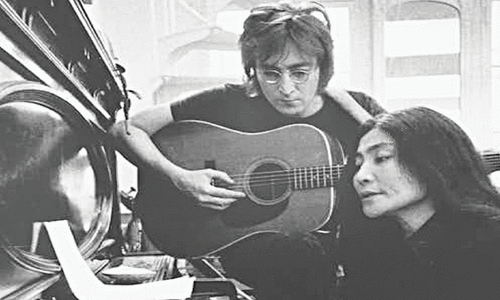
In Chain Aye Na (CAN) Rayan (Shehroz Sabzwari) plays the boy-next-door with a dark secret that even the film’s director may not know of: he suffers from a disorder known as erotomania.
Rayan believes a girl he met at a wedding is secretly in love with him … despite her protests that include two hard slaps across his face. Both Rayan and writer-director Syed Noor are inspired by the wrong era: the ’90s — a time where obsessive, unrequited love didn’t qualify as a mental disorder. Back then, a hero slapped his heroine into romantic submission. Today, she will most likely sue him out of house and home.
Rayan, though, is undaunted by such trivialities. His high self-esteem compels him not to take ‘no’ for an answer. In a fit of egotistical fallacy befitting Shah Rukh Khan, Rayan proclaims that he will marry ‘his’ girl Ruba (Sarish Khan) on February 12 — a date she is set to tie the knot with her fiancé Murad (Adil Murad as the cigar-chomping villain).
Dumbfounded by one-sided love, Rayan isn’t breaking a sweat about evident problems, such as Ruba living in a far-off city or that he doesn’t have her phone number, address or a game-plan to woo her. Again, for him, they are trivialities.
Chain Aye Na and Geo Sar Utha Kay are futile attempts at reviving classic Lollywood
Packing his bags and bidding adieu to his good-natured dad (Behroze Sabzwari) he leaves lush-green Lahore for Karachi — a city with a littered railway station, drab concrete underpasses and dusty skyscrapers (the jarring change in visuals is the director’s, the government’s and municipality’s fault. Karachi does not look this bad).
Once here, the lad finds himself a temporary residence with a friend of a friend (Danish Nawaz called by his first name in the film) who runs a rock band that gigs at weddings. Rayan, himself a skilled musician, swiftly unpacks his saxophone and joins the group while trying to locate Ruba.
At this point the sax prompts Danish to ask Rayan why he’s lugging an instrument from a bygone era. The query is dismissed by a mundane reply by Rayan to the effect that “old is gold.”
In cinematic terms the instrument draws a certain parallel: Syed Noor is the saxophone — an old musical instrument in the age of electric guitars. The saxophone is an official declaration of Noor’s natural disposition to cinema. His style — from the way he maps out the story, shoots his scenes and choreographs his actors — is old-school. These days, they mix as well as oil and water.

I can foresee unjustified decrees slapping Noor’s directorial abilities because of our own partiality to how we want stories to be told today.
As a director of experience, he unfurls the story at a breezy pace. Only the first 15 minutes — with badly-placed edits, mistimed dialogue delivery and the ’90s tone and songs (some of them engaging) — take getting used to. Once attuned, the sting of yesterday’s tempo doesn’t hurt as much and one appreciates the little things.
For example: regardless of the single-minded desperateness of the hero — or the dreadful way the film climaxes (spoiler: Rayan gets the girl) — CAN is family-friendly fare.
Noor’s screenplay, simple in concept, mounts up a long running time where it plays up many subplots. Some of these give veteran actors — Nadeem (Ruba’s dad), Atiqa Odho (mom) and Mustafa Qureshi (Murad’s politician father) — room to flex their acting chops. The younger generation, with slight exception to Sarish Khan, need to enroll in acting school, especially Adil Murad, whose vocal tone is monotonous.
Nadeem Baig, with his decades of experience, is instantly likable as the loveable dad whose passion for music is rekindled by Rayan. The veteran actor’s genuine-looking over-enthusiasm in the film’s last-half also comes off as another parallel for Noor. Like the director, the old man wants to feel young by doing hipper things.
For the younger lot — the know-it-all-Gen-X viewers, critics and filmmakers — the experience is vexing. Or at the very least embarrassing.
Brimming with blinding fury, we know that Lollywood is (thankfully) dead and gone, but our youthful arrogance doesn’t entertain patience for the ones who need to catch up. When they miss, we label them incompetent with lightning-fast typing reflexes on social media or magazines.
Yes, in the case of CAN there are pitfalls and flaws, especially with marketing and casting. However, there’s also a measure of nostalgic familiarity — a feeling none of us may be interested in buying at the ticket counter.
Geo Sar Utha Kay
A small, remote dusty town in Sindh is in perpetual turmoil. It is terrorised by a villain named Kallo — a roaring, red-eyed, tribal bracelet-wearing highway robber who helps spread foreign-funded terrorism in rural areas. To put it in the US president’s words: “he is one mean hombre.”
Kallo is played by Shafqat Cheema (obviously since he’s also the producer) — an actor whose career of 900-plus motion pictures mostly features a variant of Kallo. Cheema does what he does best. As Kallo, he growls, leaves people hanging at town wells and attends late night mujras that look like raves — a film such as this needs a steamy item number.
Kallo is also fairly benevolent at times. Once he gives a locally-deputed Police SHO Roheel (a fairly good Babar Ali) a free pass on a bungle-up.
Roheel had helped a bus full of civilians escape Kallo’s men. On board was a vacationing supercop from Lahore (Naeem Khan) who makes it his duty to briefly fend off highwaymen before being riddled by bullets. His inseparable friends (also supercops) — Sheryar Cheema, Umar Cheema (Shafqat’s sons) and Yasir Khan — learn of Kallo and demand a transfer to Rajnapur to avenge their friend’s death. Their superior forewarns them: even the army couldn’t liberate Rajnapur from tyranny. There is pure evil there.
Not really a Western — but as close to one as possible — this modification of The Seven Samurai theme makes do with amateur acting, one dimensional characters, ill-used emotional ties and make-shift heroines.
Some measure of professional acting comes from the elder Cheema, Babar Ali and Nayyar Ejaz (Ejaz plays the local Choudhary and the promotional material lists his qualities as “wicked, selfish, traitor”).
Geo Sar Utha Kay (GSUK) with an utter lack of story runs like a wild locomotive. The rampant pace shot with flair by Salman Nafees shakes you with ceaseless gusto. For a moment one forgets about the bullet holes in its storytelling.
Director Nadeem Cheema shows promise with a tilt towards kinetic shot design. His talent, however, is brought down by editor Adeel PK who either had little footage to cut from or deliberately hacksawed through shots and scenes. The songs by Sanvel Khan are as loud as the film.
GSUK could have been much better if casting had been done properly and the film had a better screenwriter. Three good actors with one scene among them — and about 15 minutes of kinematic action — can only drag one’s interest so far.
Published in Dawn, ICON, August 20th, 2017














































